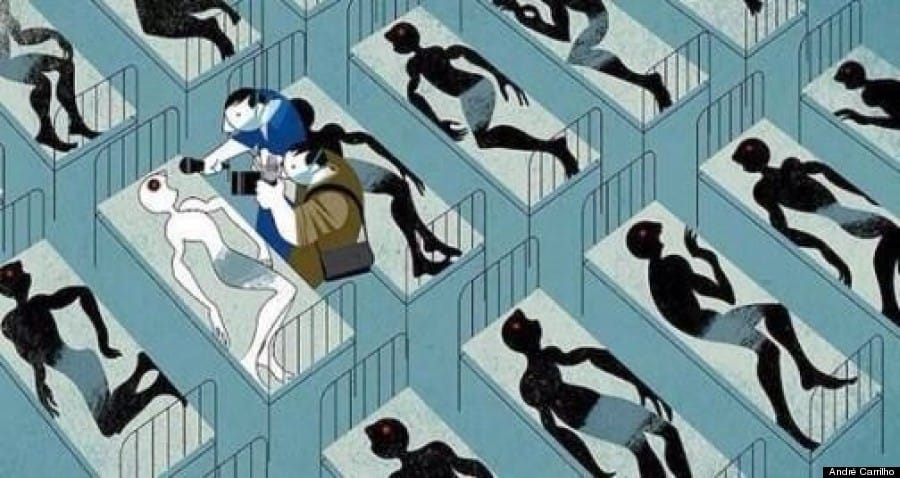Here in Madrid I take a twenty minute walk to mass every Sunday. Directly in my path is the hospital. Her hospital. The one with the ‘Ebola Nurse’. The local papers run several front page stories about her every day. A bank of cameras and news vans huddle permanently just outside the gate waiting for something. There was even a public debate about whether her dog should be euthanized — animal rights on one side and Ebola paranoia on the other. Paranoia won. Excalibur, the dog, was destroyed Wednesday. Her husband remains in quarantine.
As I passed by Sunday evening on my way to church, I looked up at her sixth floor window. At what, exactly, I’m not sure. For what, exactly, I don’t know. It’s not often you know the name of a stranger on a particular floor of a hospital. It’s not often an entire floor is given over for one patient. In any case, we fixate on that which threatens us. Otherwise, we turn away. The image above from Vanity Fair contributor André Carrilho tells this sad truth with haunting eloquence.
Carrilho’s image sits comfortably in line with biblical parable and prophecy. Disease becomes a catalyst for prophetic social commentary and Ebola, the latest leprosy. It’s no accident that leprosy figures so prominently in the biblical narratives. The scriptures are about love and leprosy (like Ebola) is a disease of untouchability. The natural suffering of illness (contamination) begets a moral evil (marginalization). Disease, Ebola or otherwise, is not our only ailment. There is blindness too, and the current crisis might be one of attention and care more than contagion.
Ebola isn’t the only disease that deserves our attention, nor is it the most dangerous. But the way in which it has captured our imagination (or failed to) in recent months reveals a disease far more deadly and pernicious. Its symptoms? Fear and isolation. Paranoia and exclusion. With this disease we ask only, Is it contagious? Can I catch it? We’re obsessively concerned about one sick person when thousands are dying. And why? Because we’re worried that it might touch us. And what if? What if the lives and suffering of others actually affected us?
Here’s another question: What if we came to understand that they already do? What if we knew that remaining untouched and unmoved meant that we were already dead? What if, instead of fear we were struck with care, instead of paranoia, love? What a cure we would have found! Perhaps then we would move more quickly. Perhaps then we would answer the cries for help. Perhaps then we would replace every selfless infected nurse with a thousand more.



